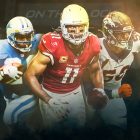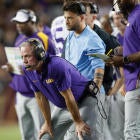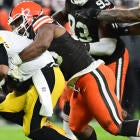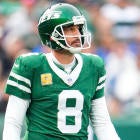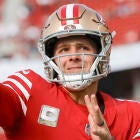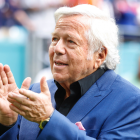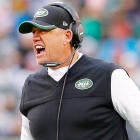At its core, the NFL Draft is nothing more than a glorified crapshoot -- a 32-team gamble on some of the best talent from the college football ranks. Oftentimes, picks just don't work out. Circumstances shorten careers. Production doesn't translate to the pros. Teams or players don't work well together.
But sometimes, picks do work. For every draft bust, there are plenty of absolute booms. And the beauty of the draft is unearthing those hidden gems -- or striking what's already perceived as gold.
In celebration of the 2020 NFL Draft, we've combed through league history to identify all the best times that gambles did work, compiling the all-time best draft picks for each and every team. From Tom Brady to Roger Staubach, the list is chock-full of star power -- and proof that some of the game's biggest legends are born through the draft.
Before diving in, here's a positional breakdown of the 32 all-time top picks:
QB: 9 | LB: 6 | RB: 5 | DE: 3 | WR: 3 | OT: 2 | CB: 2 | TE: 1 | DT: 1
Can you guess who made it? How about your favorite team's best pick? Buckle up and find out:
Arizona Cardinals
Player: WR Larry Fitzgerald
Year: 2004
Pick: 3rd overall (first round)
Our first all-timer hails from the modern era, and there aren't any other Cardinals who come particularly close to matching Fitzgerald's legacy. Aeneas Williams had a Hall of Fame career in the secondary, but Fitz has defied time like few others. An 11-time Pro Bowler and two-time NFL receptions leader, No. 11 hit his prime circa 2007-2008, when he was an unstoppable force on the Cards' NFC title run. More than a decade later, he's still among the game's most reliable, with 1,300 career catches and 17,000 yards to his name.
Atlanta Falcons
Player: CB Deion Sanders
Year: 1989
Pick: 5th overall (first round)
In a year or two, it might be impossible to vouch for a guy who played just five years in Atlanta as opposed to Julio Jones, who's already racked up 12,000 career receiving yards and 50-plus touchdowns. But Deion is Deion, and even if he won his Super Bowls and made his money elsewhere, he was the face of the Falcons' 1990s defense. With 10 total touchdowns for Atlanta from 1989-1993, he was a true threat to change the game whenever he took the field. He also helped the Falcons snap an eight-year playoff drought.
Baltimore Ravens
Player: LB Ray Lewis
Year: 1996
Pick: 26th overall (first round)
Ed Reed and Jonathan Ogden deserve consideration here, but Lewis is the bigger name -- not just because of popular opinion but because of an unprecedented 17-year career. A 13-time Pro Bowler, his No. 52 is immortalized in Baltimore, where he captained the Ravens to a pair of Super Bowls, earned two Defensive Player of the Year honors and combined raw emotion with more than 1,300 logged tackles to become one of the greatest to ever play middle linebacker. Off-field questions aside, he's probably the most iconic player in team history.
Buffalo Bills
Player: DE Bruce Smith
Year: 1985
Pick: 1st overall (first round)
If you prefer Hall of Fame QB Jim Kelly, that's fine. Thurman Thomas and Andre Reed, the other pieces of Buffalo's "K-Gun" squad of the 1990s, also warrant recognition. But Smith's production has never been matched. A 10-time All-Pro and 11-time Pro Bowler with the Bills, he not only lived up to but elevated the expectations of a No. 1 pick, destroying opposing lines to the tune of 200 career sacks -- a mark that still stands atop the all-time leader board. The offensive guys may have gotten the hype, but Smith was absolutely the scariest.
Carolina Panthers
Player: WR Steve Smith
Year: 2001
Pick: 74th overall (third round)
This one might catch flak considering Julius Peppers ranks fourth on the all-time sack list after 10 total seasons in Carolina, and the Panthers' recently retired pass rusher could easily fit here. Smith, however, spent three more years with the team and turned in a similarly Hall of Fame-caliber career. Undersized at 5-foot-9, he still torched defenses with his physicality and swagger, becoming one of the NFL's feistiest play-makers during a five-time Pro Bowl run that included 14,731 career receiving yards -- the eighth most of any WR in league history.
Chicago Bears
Player: RB Walter Payton
Year: 1975
Pick: 4th overall (first round)
Brian Urlacher and Mike Singletary were around just as long, anchoring title-contending Bears defenses of different eras. "Sweetness" was on a different level, though, setting the stage for the modern-day multipurpose back. A nine-time Pro Bowler, one-time NFL MVP and two-time Offensive Player of the Year, Payton retired as the all-time leader in rushing yards and receiving yards by a non-receiver, serving as the offensive focal point of Chicago's first Super Bowl team. His 16,726 career ground yardage still ranks second in league history.
Cincinnati Bengals
Player: OT Anthony Munoz
Year: 1980
Pick: 3rd overall (first round)
Our first offensive lineman of the all-timers, Munoz may have been the best to ever play his position. A supposed injury gamble coming out of USC, he proceeded to play 13 seasons as Cincinnati's left tackle, earning Pro Bowl trips for all but two of them. One of the biggest reasons the Bengals made two Super Bowls in the 1980s, he also racked up 11 All-Pro honors and four different NFLPA Lineman of the Year awards, anchoring an offense that featured a fellow future Hall of Fame finalist in Ken Anderson.
Cleveland Browns
Player: RB Jim Brown
Year: 1957
Pick: 6th overall (first round)
It's hard not to be your team's best draft pick when you also happen to be one of the greatest to ever play football. Brown owns just about every accolade you could hope for -- three NFL MVP awards, eight rushing titles, nine Pro Bowls, nine All-Pro honors and a league championship. The only player in NFL history to average more than 100 rushing yards per game, he retired as the record-holder for most major rushing categories, logging six 1,300-yard campaigns and five double-digit touchdown totals. He might have the best nine-year career of any player ever.
Dallas Cowboys
Player: QB Roger Staubach
Year: 1964
Pick: 129th overall (10th round)
Dallas is chock-full of legendary draft picks, from Troy Aikman and Emmitt Smith to Larry Allen and Michael Irvin. If it comes down to the QBs, Aikman typically gets the nod because he's got three rings, but Staubach may have accomplished more with less during an era in which passing wasn't as prolific. A two-time Super Bowl champion himself, he was the Cowboys' first true franchise QB, leading the team to four title games as a starter, leading the NFL in passer rating four times and helping shape "America's Team" into a true power.
Denver Broncos
Player: LB Von Miller
Year: 2011
Pick: 2nd overall (first round)
John Elway wasn't drafted by the Broncos. His teammate Terrell Davis could easily be argued here. But Miller isn't just a product of recency bias. He's a historic producer at a premier position. A seven-time Pro Bowler and All-Pro honoree, he already owns Denver's record for most career sacks (106) and, at age 31, has a reasonable chance of hitting the top 10 in NFL history. A pivotal piece of the Broncos' Super Bowl 50 title team, he's been a regular model of pass-rushing dominance, failing to hit double-digit sacks just once in eight seasons.
Detroit Lions
Player: RB Barry Sanders
Year: 1989
Pick: 3rd overall (first round)
Calvin Johnson may have given him a run for his money had he kept playing, but Sanders will forever be known as one of the NFL's greats. Like Johnson, he ended his career in his prime, but even still, he's an all-timer. A four-time NFL rushing leader and 10-time Pro Bowler, Sanders not only wowed with his elusiveness but with his production, retiring just 1,457 yards behind the No. 1 rusher in league history. The NFL MVP in 1997, he averaged more than 1,500 yards per season and hit 2,000 yards on the ground during his second-to-last pro season.
Green Bay Packers
Player: QB Bart Starr
Year: 1956
Pick: 200th overall (17th round)
Brett Favre wasn't drafted by the Packers, and Aaron Rodgers has six fewer championships. It's not as if Starr just lucked his way into two Super Bowl wins and five more NFL titles, either. Green Bay historians will admit Starr wasn't the most gifted of passers, but he more than made up for his arm with his intangibles, five times leading the NFL in passer rating, earning 1966 MVP honors and willing the Packers to their dynastic run. He was the league's all-time leader in completion percentage upon retiring, and he still ranks as the all-time leader in postseason passer rating.
Houston Texans
Player: DE J.J. Watt
Year: 2011
Pick: 11th overall (first round)
Don't overlook Andre Johnson here, but there's no question Watt's been the best Texan to play the game. Injuries have threatened his career on multiple occasions, but the hulking pass rusher has done nothing but respond with more production. Named the NFL's Defensive Player of the Year three times in a five-year span, the five-time Pro Bowler has led the league in sacks twice and regularly ranks among the game's most feared DEs. He's logged more than 16 sacks in four different seasons and is still powering through at age 31.
Indianapolis Colts
Player: QB Peyton Manning
Year: 1998
Pick: 1st overall (first round)
They don't get much easier than this. Manning is the gold standard of QBs. While he "only" won two Super Bowls, he also set just about every major passing record upon retiring after 18 years, all but four of which he spent in Indy. A 14-time Pro Bowler, 10-time All-Pro, five-time NFL MVP and four-time touchdown passing leader, he was heralded for his smarts as well as his leadership, and he's the reason the Colts were relevant throughout the 2000s. When you make a No. 1 pick, you only hope the player is a fraction of what Peyton was.
Jacksonville Jaguars
Player: RB Fred Taylor
Year: 1998
Pick: 9th overall (first round)
Tony Boselli works just as well, but Taylor endured an injury-prone label to log seven different 1,000-yard seasons, a career 4.6 yards-per-carry average and play a central role in some of the Jaguars' first-ever playoff runs. Even late into his career, when Jacksonville introduced his successor in Maurice Jones-Drew, the veteran gritted his way to personal-best numbers, averaging 5.4 yards per rush during his second-to-last year in Florida. Durability may not have been his thing, but compared to today's RB standards, he was top-tier material.
Kansas City Chiefs
Player: TE Tony Gonzalez
Year: 1997
Pick: 13th overall (first round)
Much like Manning in Indianapolis, Gonzalez is a no-brainer by virtue of him being one of, if not the, best to ever play his position. A model of consistency, he went to 10 Pro Bowls in 12 seasons with the Chiefs, setting all major K.C. receiving records -- and paving the way for all major TE records across the NFL -- with four separate 1,000-yard seasons and nine different years of at least 70 catches. Gonzalez kept up his all-star pace with the Atlanta Falcons will always be remembered as a Chief, making a legendary name for himself in K.C.
Las Vegas Raiders
Player: RB Marcus Allen
Year: 1982
Pick: 10th overall (first round)
Super Bowl MVP for the 1983 Raiders, Allen did it all in more than a decade with the team. While he never eclipsed 1,000 rushing yards after doing it three straight seasons early in his career, he made a name for himself as a pass catcher as well, becoming the first NFL player to log 10,000 rushing yards and 5,000 receiving yards in his career. A five-time Pro Bowler with the Raiders, he served as a face of the Los Angeles franchise in the 1980s, when he also earned NFL MVP honors and rose to No. 1 on the league's all-time rushing TD list.
Los Angeles Chargers
Player: LB Junior Seau
Year: 1990
Pick: 5th overall (first round)
Chargers draft history includes some illustrious names -- Dan Fouts, Kellen Winslow, Philip Rivers, Rodney Harrison. Not even Rivers, however, was at the top of his game for as long as Seau was. QBs will always be more important, but the big-bodied USC product was the face of the team in San Diego for his entire 13-year run with the Chargers. A Pro Bowler in all but one of those years, he served as the heart of his defense, missing just seven games in more than a decade as a starter.
Los Angeles Rams
Player: DE Deacon Jones
Year: 1961
Pick: 186th overall (14th round)
Eric Dickerson is a splashier name, but Jones may have ranked as the NFL's all-time top pass rusher if sacks, a statistic he invented, were recorded during his time. A seven-time Pro Bowler during his 11-year run with the Rams, Jones was the ultimate draft steal in the pre-Tom Brady era, going from late-round afterthought to No. 1 feared defensive end, a household name with two Defensive Player of the Year honors on his Rams resume. There's a good reason he was part of the NFL's 75th Anniversary All-Time Team.
Miami Dolphins
Player: QB Dan Marino
Year: 1983
Pick: 27th overall (first round)
From start to finish, Marino paid off as the team's anointed franchise QB, even if he never delivered a Lombardi Trophy. Crowned everything from Rookie of the Year and Comeback Player of the Year to NFL MVP, he led the league in passing yards five times and finished his career with dozens of passing records, not to mention widespread recognition as one of the game's best pure passers. Marino at least got Miami to a Super Bowl, and his presence, more than anyone's, promised Dolphins contention.
Minnesota Vikings
Player: QB Fran Tarkenton
Year: 1961
Pick: 29th overall (third round)
Alan Page, Adrian Peterson and Randy Moss all had distinguished Vikings careers, but Tarkenton is easily the most accomplished QB in franchise history, and he was arguably way ahead of his time as a dual-purpose weapon. Between two stints with the team, he not only led Minnesota to three NFC title wins and captured 1975 MVP honors but became the league's most prolific scrambler with a rushing total that still trails only Michael Vick, Randall Cunningham, Steve Young and Cam Newton. He also retired owning most major passing records.
New England Patriots
Player: QB Tom Brady
Year: 2000
Pick: 199th overall (sixth round)
Forever inflating fans' expectations of sixth-round picks, Brady is easily a top-three QB in NFL history. His Patriots didn't always escape controversy, but he remains as reliable as they come with six Super Bowl rings, four Super Bowl MVPs, three NFL MVPs and 14 Pro Bowls to his name. At age 42, he's moved on to sunnier pastures with the Buccaneers, and you can credit some of his historic success to Pats coach Bill Belichick. But you also don't win 16 division titles, four passing TD titles and three passing yards titles by accident. He's up there with the best draft picks among all teams.
New Orleans Saints
Player: WR Marques Colston
Year: 2006
Pick: 252nd overall (seventh round)
There's a case to be made for Willie Roaf here, but if anyone deserves extra recognition for their draft position, it's Colston. He wasn't necessarily a game-breaker, but he was maybe the biggest reason Drew Brees and Co. led the Saints to their first Super Bowl win in 2009. No one, after all, outside of Brees himself, gave New Orleans more consistency during those contending years. A lifelong Pro Bowl snub, he posted six 1,000-yard seasons and, perhaps more impressive, 711 career catches -- easily the most in franchise history.
New York Giants
Player: LB Lawrence Taylor
Year: 1981
Pick: 2nd overall (first round)
He was Ray Lewis before Ray Lewis, times three or four. What linebacker do you know that's won NFL MVP and three Defensive Player of the Year awards and posted seven straight double-digit sack seasons? L.T. was an absolute force on the Giants defense, causing opponents to re-evaluate how to play offense. His lifestyle may have been as aggressive as his play, but the latter was a monumental reason for New York's two Super Bowl wins during his career. Ten Pro Bowls and 10 All-Pro honors confirm his legacy.
New York Jets
Player: CB Darrelle Revis
Year: 2007
Pick: 14th overall (first round)
Shed your tears for Broadway Joe, but let's not pretend Joe Namath wasn't a thoroughly average QB. Is he a Jets legend, what with his confidence and Super Bowl title? No doubt. But if we're talking best draft pick, Revis wins, and it's not that close. While he didn't win New York a title, he certainly gave them enough shutdown defense to do so. Particularly during his first six-year stint with the team, the CB redefined "lock-down" coverage, failing to record gaudy numbers only because teams simply refused to throw his way.
Philadelphia Eagles
Player: LB Chuck Bednarik
Year: 1949
Pick: 1st overall (first round)
Before Reggie White and Brian Dawkins brought their trademark grit to Philadelphia, Bednarik modeled prototypical blue-collar production at unprecedented levels. The last of the NFL's full-time two-way players, he started at both center and linebacker, coming up big in two Eagles championships and earning 10 All-Pro honors over a career defined by hard hits and fearless leadership. Dawkins carried a similar mentality into the 2000s, but it was Bednarik who set the tone for the franchise decades before.
Pittsburgh Steelers
Player: DT Joe Greene
Year: 1969
Pick: 4th overall (first round)
Celebrate Terry Bradshaw and Ben Roethlisberger for their title-winning QB play, but before "Mean" Joe arrived, the Steelers were basically the Browns of their time. With Greene and his interior power in the fold, Chuck Noll had the most important building block for a "Steel Curtain" dynasty of a defense that saw the famed DT win two Defensive Player of the Year awards and 10 Pro Bowl appearances, not to mention become a four-time Super Bowl champion. If you want the main reason Pittsburgh became relevant, look no further than Greene.
San Francisco 49ers
Player: QB Joe Montana
Year: 1979
Pick: 82nd overall (third round)
Just like the Dan Marino, Tom Brady and Peyton Manning picks, this one simply comes down to the player's resume. Because no one's going to argue against a QB who won four Super Bowls, earned MVP in three of them, and finished his career as maybe the most clutch player in NFL history. Joe Montana is basically synonymous with San Francisco football, so there's no use wasting any more time discussing it. It'll take an awfully long time -- or awfully special person -- to unseat "The Comeback Kid."
Seattle Seahawks
Player: QB Russell Wilson
Year: 2012
Pick: 75th overall (third round)
There's a reason the Seahawks once made him the highest-paid player in NFL history. Like Aaron Rodgers, you could argue Wilson should have more than one Super Bowl ring by now, but that doesn't take away from the fact that No. 3 owns the best career passer rating among all Seattle QBs and is regularly among the NFL's elite at his position. An escape artist and master of the improbable, Wilson has overcome small size to light up highlight reels and, most of all, win more games than any other NFL QB through his first seven years.
Tampa Bay Buccaneers
Player: LB Derrick Brooks
Year: 1995
Pick: 28th overall (first round)
Warren Sapp brought the fire to Tampa Bay's championship defense of the early 2000s, but Brooks was like the Tony Gonzalez of the unit -- an insane model of consistency with a whole lot of heart. An 11-time Pro Bowler and former Defensive Player of the Year, he was a longtime tackle machine at the core of the Bucs' LB corps, a rightful Hall of Famer and one of the steadiest, strongest reasons Tampa made so many playoff runs at the turn of the century.
Tennessee Titans
Player: OT Bruce Matthews
Year: 1983
Pick: 9th overall (first round)
If you forgot the Titans were once the Oilers, here's your reminder. Matthews endured the franchise's transition to become the only Titan to have his number retired, and there's good reason for that. Not only did the big man start 293 games, the second most of all time, but he played every position on the offensive line, earning 14 Pro Bowl appearances and nine All-Pro honors over the course of an incredible 19-year career. Matthews is a 1990s All-Decade Team honoree but made an impact for far more than a decade.
Washington Redskins
Player: QB Sammy Baugh
Year: 1937
Pick: 6th overall (first round)
In his day, playing only QB was uncommon, so Baugh also took reps as a punter and defensive back. But he's famous for his advanced abilities as a passer. At a time when throwing the ball was simply not a standard, or at least effective, part of the game, he came in and revolutionized aerial strategy. A two-time NFL champion and six-time All-Pro, Baugh led the league in completion percentage seven different times and earned Player of the Year honors for his unprecedented passing production in 1947 and 1948.







